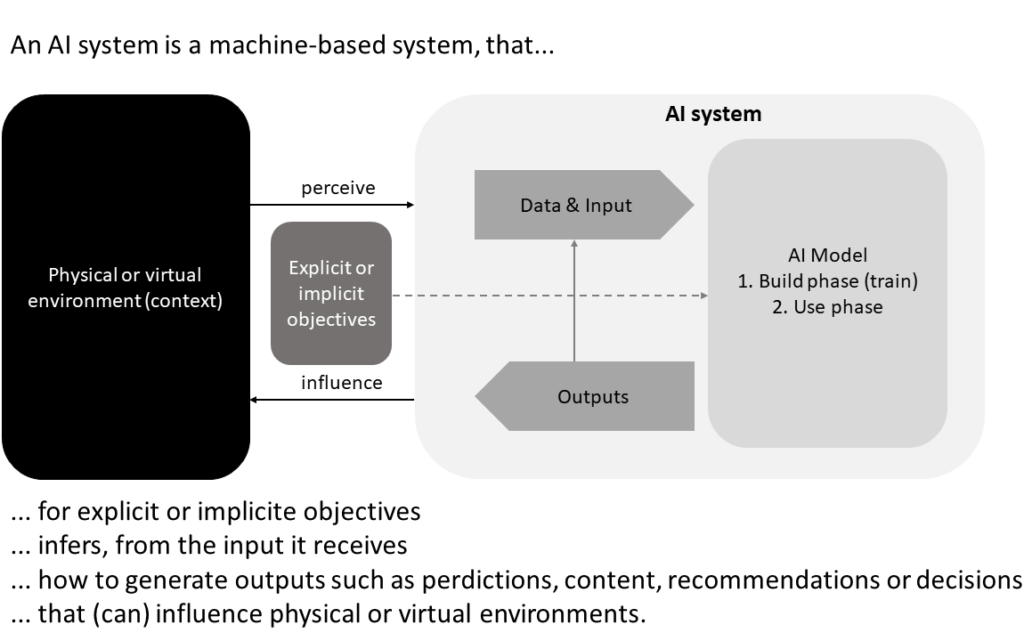Deciphering AI in education:
A MULTI-FACETED CHALLENGE
The elusiveness of a universal definition of AI
Defining artificial intelligence (AI) in the context of education is like trying to hold water in your hands – it’s complex and elusive. The main challenge in forging a universally accepted definition of AI lies in its inherently multifaceted nature. Unlike more static fields of study, AI is a dynamic, ever-evolving entity, making any single definition both limited and temporary.
AI: an umbrella term with many facets
As an umbrella term, AI covers an astonishing range of technologies and applications. This diversity is not limited to technological aspects, but extends into psychological, ethical and educational areas. Technologically, AI encompasses everything from simple algorithms to complex neural networks. Psychologically, it intersects with our understanding of human cognition and learning. Ethically, it raises questions about privacy, autonomy and justice. Pedagogically, it offers new approaches to teaching and learning that challenge traditional educational paradigms.
AI: a moving target
The challenge of defining AI is compounded by its nature as a ‘moving target’. The field is characterised by rapid advances and continuous innovation, reshaping the educational landscape almost as quickly as it is understood. This aspect underlines the need for educators and policy makers to remain agile and informed, and to adapt to the evolving capabilities and applications of AI.
AI: key concepts and building blocks
In navigating these complexities, we anchor our understanding in the definition of AI provided by the European Commission’s High-Level Expert Group (2018):
“Artificial intelligence (AI) refers to systems that display intelligent behaviour by analysing their environment and taking actions – with some degree of autonomy – to achieve specific goals. AI-based systems can be purely software-based, acting in the virtual world (e.g. voice assistants, image analysis software, search engines, speech and face recognition systems), or AI can be embedded in hardware devices (e.g. advanced robots, autonomous cars, drones, or Internet of Things applications).”
This definition states that AI systems are characterised by their ability to exhibit intelligent behaviour, analyse their environment and take action to achieve specific goals. This provides a basic understanding that encompasses both software and hardware manifestations of AI.
Building on this, the OECD definition (2023) adds further dimensions by focusing on the adaptability and autonomy of AI:
“An AI system is a machine-based system that for a given set of explicit or implicit objectives, infers from the input it receives how to generate outputs such as predictions, content, recommendations or decisions that can influence physical or virtual environments. Different AI systems vary in their levels of autonomy and adaptiveness after deployment”.
It describes AI systems as machine-based systems that reason about how to generate outputs such as predictions, content or decisions from given inputs. This perspective is consistent with the European Commission’s definition, but emphasises the adaptiveness and continuous evolution of AI after deployment, which is crucial in educational contexts.
Conclusion: A consistent yet evolving understanding
Our exploration of AI in education therefore revolves around a central understanding, informed by the European Commission, enriched by the findings of the OECD, and broadened by our perspective on the triadic synergy of research, teaching and policy-making. This approach recognises AI as a technologically advanced, cognitively mimetic, ethically challenging and pedagogically transformative tool. It emphasises the importance of an adaptive, informed approach to integrating AI into educational strategies, ensuring a balance between technological advances and ethical, psychological and pedagogical considerations.

